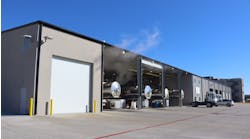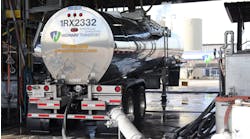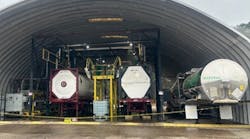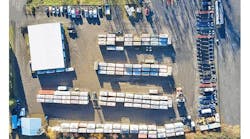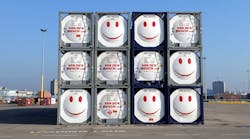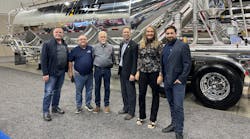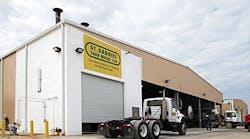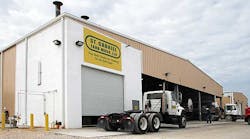Less than a year after opening its doors, St Gabriel Tank Wash LLC has become a bustling operation. Each day, a steady parade of chemical tank trailers moves through the five-bay wash rack in St Gabriel, Louisiana.
Many of those trailers have carried products that are among the most difficult to clean, including isocyanates and viscous chemicals. The wash rack also handles a wide range of general chemicals, such as surfactants, plasticizers, amines, acids, polymers, latex, resins, and herbicides.
“We're able to clean out virtually any chemical our customers send us,” says Galen Younger, vice-president of sales at St Gabriel Tank Wash. “We spent about 2 1/2 years planning a wash rack that could meet the needs of tank truck fleets in this area and the United States, and customers are responding.
“We're growing at the rate we expected. We want controlled growth, in order to ensure that we are doing a good job for our customers and the shippers they serve.
“We'll continue to add cleaning services. For instance, we plan to obtain kosher certification in the next few months for cleaning our customers' kosher-certified tanks.”
Cleaning operation
St Gabriel Tank Wash was developed by Jimmy Younger, company president, who also owns Nederland Tank Wash Inc in Nederland, located in the Golden Triangle region of southeast Texas. Nederland Tank Wash has been in business for several decades and is focused on all aspects of cleaning petro-chemical tank trailers.
Jimmy Younger also was owner of Younger Brothers Inc, a petro-chemical hauling and wash rack company, for over 65 years. In addition to Galen Younger the experienced management team includes Dodie Sterling, vice-president of operations; and Rob Gilmer, general manager.
The new wash rack in St Gabriel has five cleaning bays, four of which are inside the main 10,900-sq-ft building. An adjacent outside area can be enclosed as cleaning demand grows to give the wash rack up to two additional indoor bays.
One interior wash bay is used for tractor pump and product hose cleaning. Another is reserved for pre-loading preparation of tank trailers.
“We do a lot of shipper-specific trailer preparation, and we have nitrogen available for the pre-load prep process,” Galen Younger says. “We do a vacuum check of valves, and some shippers require a leak test. Sometimes we'll have to replace gaskets. The trailer prep generally takes 30 to 40 minutes.”
The vat-style wash system was designed in-house and built by Garcia Industries. Three 1,000-gallon vats hold rinse water and caustic, and a 1,400-gallon vat contains detergent. The outside wash bay has a 550-gallon detergent vat. Mosher Flo pumps move the cleaning solutions from the vats through the Sellers spinners. Cleaning solutions and exterior pressure washers were supplied by A-One Chemicals & Equipment Inc.
MEA system
Specialized equipment at the wash rack includes a monoethanolamine (MEA) system for cleaning isocyanates. Assembled in-house, the system consists of insulated totes and a Cloud spray ball that injects the MEA as a mist inside the tank trailer.
Hot water and steam for the cleaning operation are provided by two natural gas-fired Bryan 135-horsepower boilers. The vertical boilers provide enough steam to handle eight to 10 tank trailers at a time.
“We purchased two water-tube Bryan boilers, and they work very well in tank cleaning, Galen Younger says. “They are very reliable, and water chemistry is important to ensure efficient operation. We blow down the boilers several times a day as part of our system maintenance.”
The wash rack has a caustic scrubber for capturing and treating vapors from the cleaning vats, sumps, spinners, and wastewater. Wastewater generated from tank cleaning is hauled away for disposal. Wastewater is the wash rack's biggest operating cost, and the company is looking at water recycling options
Wash workers
St Gabriel Tank Wash currently employs 10 workers split between three eight-hour shifts. The company is able to hire experienced tank wash operators, and management has set up a training program for workers with any level of experience.
Training runs at least 90 days and includes on-line instruction from www.sentryroad.com. Twelve training modules cover a range of topics including Resource Conservation and Recovery Act (RCRA) requirements, Occupational Safety and Health Administration rules, forklift safety, personal protective equipment use, fire protection, and general safety.
“This training is tank-trailer specific, and the modules are customized specifically for tank cleaners,” Galen Younger says. “Workers get a certification of completion after successfully finishing each module.”
It's certain that more workers will be added in the future, as St Gabriel Tank Wash has plenty of room for growth. The facility sits on a 10.8-acre site, 6.5 acres of which have been developed. The wash rack currently has three tenants.
All three have their own portable offices, and they also utilize maintenance shop space that was constructed by St Gabriel Tank Wash. “Parking is already getting tight, and we will develop more of the property this year,” Galen Younger says. “Adding more shop and office space is in the future. There is no doubt that we are going to continue growing.” n
